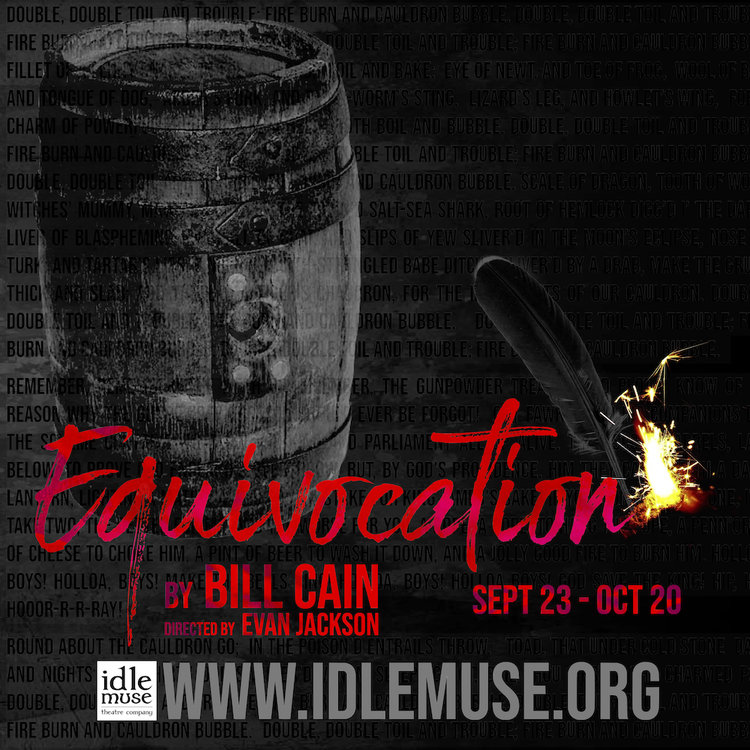
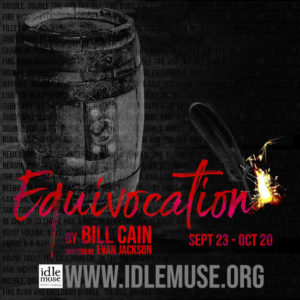 Highly Recommended ***** Powerful, poetic, and polished, “Equivocation” is a rare gem. This six-character play being performed by the Idle Muse Theatre Company (IMTC) excels, excites, and elucidates. Bill Cain’s smart and intricately constructed script will ensure that William Shagspeare (to use his contemporaries’ spelling) is remembered as the man himself and not just by his literary works.
Highly Recommended ***** Powerful, poetic, and polished, “Equivocation” is a rare gem. This six-character play being performed by the Idle Muse Theatre Company (IMTC) excels, excites, and elucidates. Bill Cain’s smart and intricately constructed script will ensure that William Shagspeare (to use his contemporaries’ spelling) is remembered as the man himself and not just by his literary works.
Director Evan Jackson has the enormous task of producing such a challenging and complicated show, which he does to perfection. With clear focus and dynamism, he engages a modern American audience by making the narrative fun, exciting, accessible, and ironic. There is plenty to chew on in this rich concatenation of comedy, tragedy, and history that doesn’t always take itself too seriously.
Edgy and often hot-tempered, Brendan Hutt plays Shagspeare (a/k/a Shag) supremely. He goes from “zero to sixty” in no time flat and gets into the face of other actors with verve. He is the beating heart of the action on stage and creates the mood: sometimes sentimental, sometimes brusque and overly certain, sometimes doubting of himself, sometimes aggressive.
With amazing skill and alacrity, Kade Cox, Jake Baker, Michael Dalberg, and Emerson Ellis play a myriad of supporting roles, perhaps as many as thirty. From King James I of England to Henry Garnet, from guards to members of Shagspeare’s theatre company, all four shine brightly. They are gems—poised and proper and brazen at the same time—that reflect off Hutt’s radiance and completely fill the stage with their scurrying activity.
Kali Skatchke (Judith) plays the role of Shag’s younger daughter. She literally picks up the pieces when Shag no longer knows how to deal with the confused state of affairs surrounding him, namely, the milieu of royal power, religious intolerance, and political advocacy: a reality which he has been thrust into, not of his own free will. 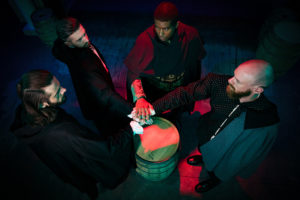
The backdrop is the English monarchy and the hegemonic state of the early 17th century, where Scotland and England have merged into a precursor of modern Britain. As the best and most popular playwright in England, Shagspeare is commissioned by Prime Minister Robert Cecil to write a “true historie” of King James I and the foiling of the Gunpowder Plot (1605), otherwise known as the plot to blow up Parliament. Given a tome (supposedly written by the king) to adapt into a play, Shag doubts the veracity of the account of the various events and testimonies. What’s more he is not sure whether the story that he is supposed to produce will hold an audience’s attention. He resents above all that his final product is to be a propaganda piece supporting King James’s rule and that of the Stuart line. But if he refuses or fails in his task, then his life and those of his company are at severe risk.
What saves him and his crew is his daughter’s skill in dissecting the underlying meaning of why the king wants him to write this piece. Through her help, Shag learns first-hand what is meant by the term “equivocation.” or finding a deeper meaning behind another person’s expressions or interrogations in order to save oneself from death or dismemberment. Specifically, “equivocation” was a contrivance developed by the Jesuits of that era to allow for the possibility of one or more meanings or interpretations of words or phrases, often with the intent of deceiving or misleading others. For those of religious faith who wanted to remain truthful and honest to themselves, it became a matter of saving their soul (their eternal jewel) in addition to their (mortal) life. This stratagem was especially important during a time period when the head of state and the head of the church were one and the same in the body of the English monarch. Treason could easily be associated with deviation from the king’s dictates or desires—and could even extend to belief in the “Old Religion”, i.e., Catholicism.
Shagspeare thus equivocates, if you will, and presents the monarch with the completed tragedy of “Macbeth” (1606) rather than a play about the Gunpowder Plot. After all, it is what the king wanted, not what he had asked for. 
For those already acquainted with “Macbeth”, Cain provides an insight into its origins and development. The shortest of all of Shagspeare’s plays, there have been suspicions over the centuries as to whether King James had some hand in its writing or abridgement. Cain puts forward his own conjecture. For example, James I had a fondness for witches and darkness and believed that demons were real (or at least, they were real in his own mind). Even if Shagspeare did not believe in demons, he would have had no choice as to their inclusion in his script, for, as a playwright, he would serve at the pleasure of the king.
The existence of witches in “Macbeth” (metaphoric or not) opens up the likelihood of demon possession, or at least, the belief that supernatural influences can have a real effect on people and events. With demons acting in this world to displace us, everybody and anybody is fair game. This begs the issue of determinism and free will: Do people freely choose their actions or are they at the mercy of their stars, or their fate? Now add the notion of equivocation to all of this, which is best summed up by the three evil sisters in the opening lines of “Macbeth” when they state: “Fair is foul; and foul is fair.” Hence, evil may be disguised as being part of the good, such that people might deceive themselves into performing any act—especially a morally dubious one—in order to further a larger goal of their own choosing. Piercing the veil between the earthly realm and the supernatural one may not be possible to determine an individual’s motivations for action. By highlighting this moral ambiguity, “Macbeth” is thought to be one of Shagspeare’s finest creations, with its complexity of characters and their flirtations with evil.
In Cain’s script, King James loves the finished product. He does not embrace evil, but he is not averse to partner with it when it suits his larger purpose. He sees how Macbeth uses equivocation as an excuse to commit greater and greater misdeeds, which can be easily papered over in the name of “the true good of the nation.”
From Cain’s perspective, the contemporaneous events in Shagspeare’s life had an important bearing on his writings; these were clearly not created in a vacuum. As Shagspeare goes back in history to ground his propaganda piece, so Cain does the same with his own script.
Just as the various layers of the play reveal themselves over time, so do the layers of costumes and the extraordinary number of costume changes; many of which occur in areas on stage directly in front of the audience. Joshua D. Allard must be called out for designing all those fine outfits—ranging from kingly attire to that of servants, priests, prisoners, and commoners. His brilliance is not only apparent in the impeccable look of the garments but in their versatility, considering all the different characters that they are meant to represent. Plus the apparel is created in such a way so as to enable quick transitions between one character and the next.
Carrie Hardin has done a highly respectable job as a voice and dialect coach for the production. What is intriguing is the collision of Shakespearean and modern English during different parts of the play. The characters normally speak in modern (often highly accented) British English, but the various plays within the play take place in Shakespearean dialogue, including the use of soliloquies.
Libby Beyreis, violence coordinator, stages the brawls with finesse, especially the sword fighting. Intimacy designer Jennifer L. Mickelson deserves special recognition for her fine work in making actors comfortable with each other when they are in close contact during several parts of the performance, especially during prison scenes.
Milo Bue’s set is not lavish but convincing enough of early seventeenth century England. Tristan Brandon’s props add to the overall ambiance. The only “fault” with the performance is that it is not set on a large enough stage; therefore, the actors must be more constrained than they need to be.
Dare not equivocate about seeing “Equivocation.” The script takes a stab at the meaning of truth and what we can choose to accept as being good, decent, and honest. Yet it’s a joke on the theatre, and life as being theatre. The acting is forceful and passionate, and the directing dynamic and bold. The production is in a class by itself, a jewel to be treasured, much like the immortal bard himself. 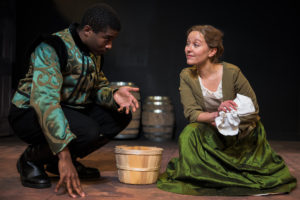
The Idle Muse’s production of “Equivocation” is playing through October 20th at the Edge Theatre Off Broadway, at 1133 W. Catalpa Avenue, Chicago.
Performances are Thursday through Saturdays at 8:00 p.m. and Sundays at 3:00 p.m. with an additional performance on Wednesday, October 9, at 8:00 p.m.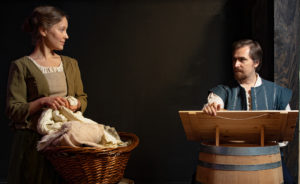
Tickets are $10-$20, and are on sale now at www.idlemuse.org or by calling 773-340-9438.
To see what others are saying, visit www.theatreinchicago.com go to Review Round-Up and click at “Equivocation”


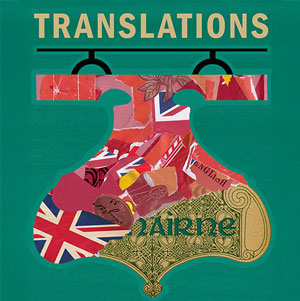



More Stories
“Translations”
“The Firebugs” reviewed by Julia W. Rath
“The Book of Grace” Al Bresloff with another from Paul LIsnek